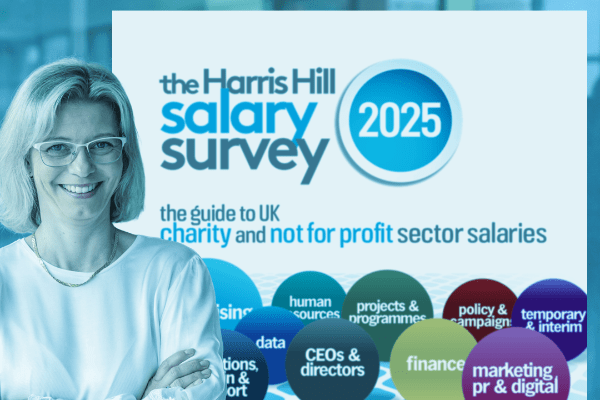Requesting a raise in the charity sector can be uniquely awkward: feeling undervalued helps no-one, but does more for you mean less for those in need? Guest writer and freelance HR specialist Nicola Greenbrook has a wealth of charity HR experience and is here to tackle this tricky dilemma.

How to negotiate a pay rise in the charity sector
Why is it so difficult to talk about money at work? We share our career experience and notable skills to strangers at interview, we present brilliant ideas in all-department meetings and reveal our goals and ambitions in our performance review. Yet, when it comes to ensuring that we’re fairly compensated, it’s tricky to engage. Asking for a salary increase can often be shrouded in utter awkwardness or sheer terror.
This apprehension can be exacerbated for those working in the non-for-profit sector, who have chosen to work there specifically for the cause and its mission. Some charities simply can’t afford to pay more than others, and in smaller organisations when funds are precious, asking for an increase can leave people feeling guilty and uncomfortable.
However, as a recent article by CharityJob explains, not asking for what you deserve and have worked hard for may cause bitterness and frustration to bubble over and ultimately impact on your work and performance. Ensuring you’re sufficiently paid a salary commensurate with your talent, contribution and market worth is not only crucial for your own money management, but ensures you’re motivated to deliver on your best work for the charity.
Here are some strategies to help you successfully negotiate a salary increase, guilt-free.

Firstly, why is it so hard to talk about money?
According to Dr Rebecca Newton, psychologist and author of Authentic Gravitas: Who Stands Out and Why, women tend to be less likely to shout about their accomplishments which can lead to their work, at times, being overlooked.
Yet, it’s a topic that causes discomfort for most of us. It’s easy to talk yourself out of asking for more money and allow that pesky inner critic to persuade you that ‘it’s not the right time’ or ‘they’ll think you’re being greedy’ and so you put it off for another month. Perhaps you’re afraid of how to handle it if the increase is rejected or maybe the actual meeting itself causes you great anxiety? For those who are naturally unassertive, discussing the M-word is off bounds.
You may be familiar with Noah Kagan, CEO of AppSumo, and his ‘coffee challenge’, where he encourages people to walk into a coffee shop and ask for 10% off their purchase. Daunting as it sounds to ask a complete stranger for a discount (not to mention the queue of grumpy, caffeine-deprived people behind you), it forces you out of your comfort zone. You may not really be fussed about a few pence off your morning coffee, but it could help you tackle a difficult conversation if you generally squirm at the idea of asking for money off.
Why not give it a go tomorrow? Starting small could help talking finances a little more easy to handle.

Do your homework
If you’re ready to take the plunge, don’t even think about diving in without getting your data in order. Do your due diligence; the more intelligence you gather, the stronger your case for an increase will be.
Determine your market value by considering the following options:
• Use guides like the Harris Hill Salary Survey to benchmark where you currently sit, and where you should. Drawn from thousands of genuine UK charity and not-for-profit vacancies from the previous financial year, you’ll find current market rates for hundreds of different roles, so yours is likely to be covered.
• Know your numbers; get savvy about the charity’s financial performance and demonstrate how your individual contribution has impacted on the company’s bottom line (effectively, the line at the bottom of of a financial report that shows the company’s net profit or loss).
• Ask your HR team about any rewards strategies or policies already in place or when any salary reviews take place so you can choose your timings wisely.
• Dip into your trusted professional network; sector or industry professionals, mentors and recruiters and those who may be willing to disclose a genuine salary comparison, to get a broad perspective. Consider ways of posing the question rather than asking outright what their salary is. Avoid asking friends or co-workers.
• Consider testimonials from trusted sector contacts, clients and suppliers. This could demonstrate you’re not the only one who thinks you’re smashing it and could further enhance your value.

I hereby state my case
In Otegha Uwagba’s Little Black Book - A Toolkit for Working Women, she presents invaluable advice on negotiating a pay rise. To ensure your salary negotiations have gravitas, the words you use will need to carry weight. She suggests outlining ‘what you’ve contributed to the organisation, presenting tangible achievements and quantifiable wins’. Be very clear on how your individual contribution to the charity justifies the need for you to earn more than you currently are.
Place the focus firmly on your value by converting your successes into tangible achievements - your second to none campaigning techniques which resulted in a high profile campaign, your unrivalled ability to build long-term relationships which brought in a major donor - rather than simply discussing how busy you’ve been.
Career expert Jill Jacinto, writing for Refinery29, makes the point that when asking for an increase, don't make it personal. Although it's likely your request for an increase is for valid financial reasons (a hike in cost of living, your desire to get on the property ladder, going to your tenth wedding this year), this shouldn’t be raised when seeking a raise. As Jill points out, if every manager awarded an increase on the basis of personal needs then businesses, especially charities, would cease to survive.

Here are some final tips for making the request meeting, gulp, a smooth one.
• Practice your talking points on a partner/flatmate/friend etc - Seek their honest feedback on your delivery. Are you umming too much? Are you speaking with conviction? Is your request clear and your reasoning sound? Perfecting the dress rehearsal could make the main performance a show stopper. If no-one’s around, video it. It might feel completely daft watching yourself talk, but you might even start to believe in yourself. Be authentic on the day though, and be prepared to go 'off script’.
• Set the scene -Arrange a proper meeting with your manager, booked in with their PA if they have one, and ideally outside of a structured one-to-one where the matter could get lost amongst operational stuff. Frame it as a business discussion, although going too ‘hardball’ may not fit with your charity’s culture, so always be yourself.
• Don't say sorry - Be assertive (not aggressive) and unapologetic. Be firm with your expectations and once you've stated the figure you are seeking, wait for a response rather than filling the silence. It’s now over to your manager…
• Open negotiations - If you’re offered an increase, either during or after the meeting, that's lower than your expectations get ready to negotiate. Consider what’s best for the charity as well as for you - this is how the best deals are secured. If it’s an outright no, for valid reasons, be prepared to query what you need to do to get a 'yes' next time. Set a goal and a deadline to revisit, so you come away with something concrete to work on.

Money talks are terrifying, no doubt. But by avoiding the topic and saving yourself the discomfort, you could be holding back your career progression and full earning potential long-term.
Asking for a raise is not a confrontational discussion, it’s an honest, professional request to be paid what you deserve. As Aliya Vigor-Roberston states in People Management Magazine, open and honest discussions about money can benefit both individuals and businesses.
So, there you go. No more excuses…
Nicola Greenbrook - HR Specialist & Freelance Writer

More from Nicola Greenbrook:
► How to handle the holiday handover
► How to manage stress at work
► Charity Careers 4: meet James Harris of Rethink Mental Illness
 |
|  |
| ► Back to the Harris Hill Salary Centre |
| ► Back to the Harris Hill Blog |
-

Opportunity for all
Find out how we’re working to deliver more diverse, equitable and inclusive recruitment…
-

Recruiting a charity CEO?
Our executive recruitment specialists have an exceptional record of successful CEO, chair, trustee and…
-

Charity sector salaries
Our 2025 Salary Survey has the latest rates and expert insight for roles throughout the sector.













